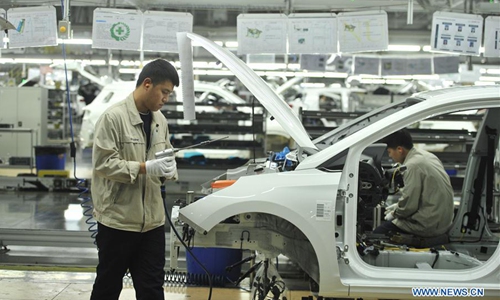HOME >> SOURCE
Auto plants worry over Hubei’s work resumption amid epidemic
By Yin Yeping and Zhang Hongpei Source:Global Times Published: 2020/3/9 21:28:40

Beijing Hyundai company in Cangzhou City, north China's Hebei Province Photo: Xinhua
Having disrupted auto production in China's auto-parts hub Hubei, the deadly coronavirus is adding woes to global markets with its spread in major industry powers including South Korea, Japan and Germany.As most areas of Hubei Province is expected to resume business soon, it is expected that the capacity recovery of the province's auto component makers can alleviate supply chain pressure for global automakers.
However, as the coronavirus is spreading overseas, demand for Chinese-made auto parts might drop, which will shortcut the highly integrated auto industry, analysts told the Global Times on Monday.
A source based in Europe told the Global Times that the virus epidemic has added woes to global auto manufacturing.
China's auto sector consists of a crucial part of the global auto supply chain, manufacturing about 80 percent of world's key components, while Hubei alone accounts for 9 percent of all auto parts supply, data showed.
Some automakers have temporarily shut their overseas plants or postponed production of some models due to supply disruptions caused by the virus.
South Korean automaker Hyundai closed domestic factories in early February. Fiat Chrysler said on February 14 that it had temporarily halted production at its Serbian plant due to disruptions related to components sourced from China.
"Global automakers have taken a bite from the parts supply shortage from China, but what if their overseas facilities were hit by the virus and accordingly reduced imports from China? That would be another round of disruption for domestic suppliers," the source said.
"And some global players' joint ventures (JVs) in China need imports, but what if their foreign suppliers cannot meet the demand due to the epidemic?" he added.
Hyundai shut down a factory in South Korea last month after a worker tested positive for the coronavirus.
If the coronavirus crisis continues to spread globally, the combined auto component exports of seven major countries which are under the shadow of the epidemic - China, South Korea, Italy, Japan, France, Germany and the US - would lose $19.48 billion yuan in 2020, reported the Securities Times.
China exported more than $60 billion worth of auto components in 2019, among which foreign-funded entities in China took up 40 percent, customs data showed.
"Despite being only 9 percent of the supply chain, Hubei is an indispensable part of the whole chain. It is very strong in auto parts and vehicles production," said Cui Dongshu, secretary general of the China Passenger Car Association. "Hubei needs to speed up the recovery because spare parts can be produced elsewhere," Cui said.
Hubei's local auto companies and component suppliers still have concerns over business improvement due to the lingering impact of the epidemic.
Yang Tonglei, a manager with Hubei Chenyuan Auto Parts Co, a supplier of Hubei-based Dongfeng Motor, said resumption rate of the company's factories may reach 70 to 80 percent at the end of March.
Located in Shiyan, Hubei, where is considered a "high-risk area" infected by the virus, Yang's factory has faced problems including losing orders and customers. "Dongfeng suspended its production from January 23 until now. Normally, this time of the year is the production and marketing season for auto companies," said Yang.
Zhu Delin, general manager of Hubei Tyrone Auto Parts Co, a supplier of Beijing Hyundai and Dongfeng, told the Global Times that "We have been back at work for a week now. It will take half a month to reach the full recovery of the production capacity."
A person close to Honda's JV with Guangzhou-based GAC, surnamed Jia, told the Global Times on Monday that the resumption rate of the JV's plants is about 50 percent. "It is difficult to say when our operation will be fully resumed. It was originally planned on March 17."
Data from Honda showed that its vehicle sales in the Chinese market in February plummeted to 11,288 units, down 85.1 percent year-on-year. Its JV with Dongfeng saw a drop by 89.3 percent in sales last month, while the JV with GAC went down by 81.5 percent.
RELATED ARTICLES:
Posted in: INDUSTRIES